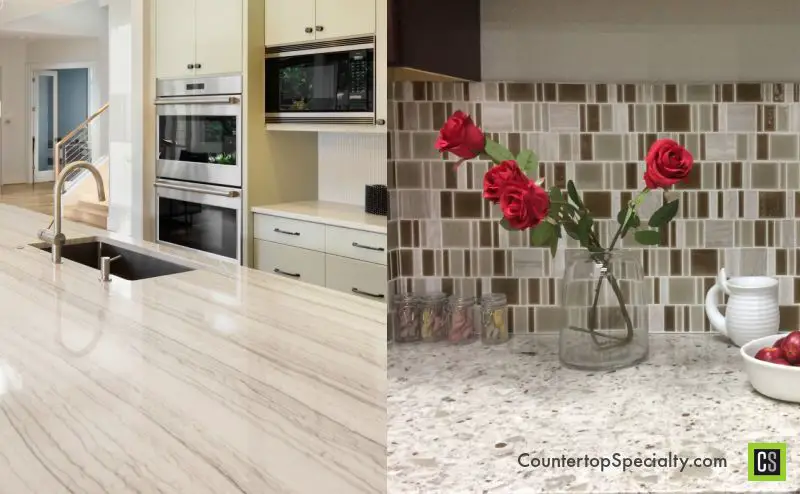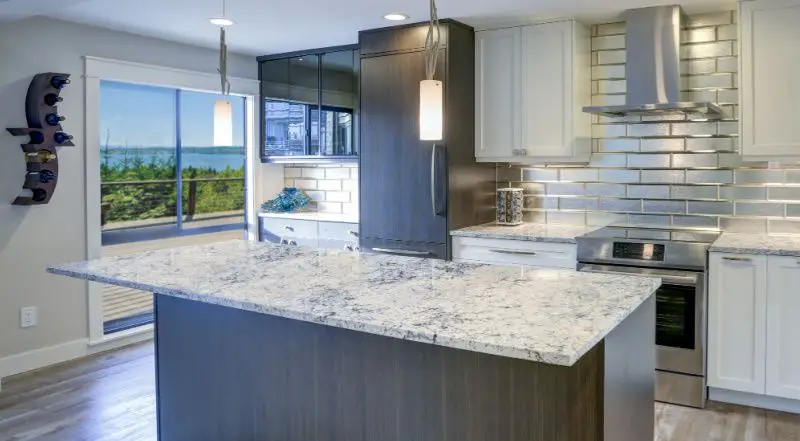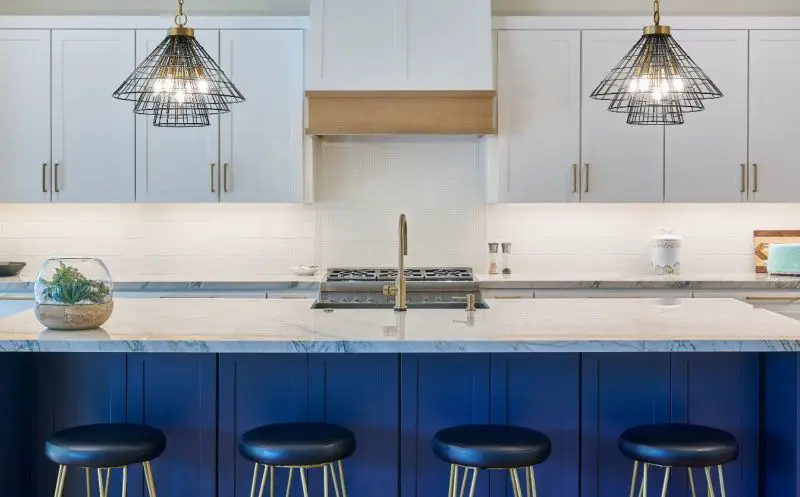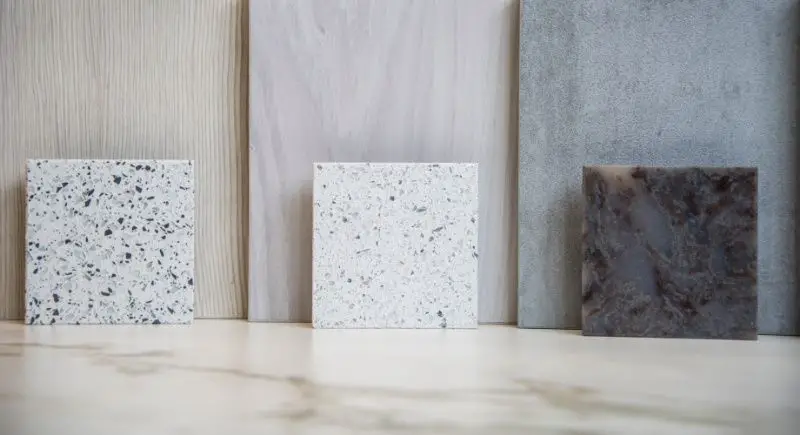Quartz vs Quartzite Countertops:
Which One Is Best for You?
With such similar-sounding names, it’s no wonder you may be confused about quartz vs quartzite countertops. Not to worry!
We’ll compare all the key characteristics of each, and what sets them apart, so you’ll know which material is best for your next home improvement project.

ON THIS PAGE
Differences: Quartz vs Quartzite Countertops
Quartz and quartzite countertops may share a similar name, but they are not the same.
- Quartzite is a natural stone like granite, and quartz countertops are man-made.
Many consumers are unaware that these are two different materials.
Natural stone and man-made countertops each have pros and cons regarding durability, cleaning & maintenance, stains, hot pans, colors, cost, and more. Let’s take a look!
What Are Quartz Countertops?
The quartz countertop is a favorite among many of today’s homeowners.
It combines the classic look of stone with advanced manufacturing technologies for a more predictable color, pattern, and performance.
Quartz, the primary component for these countertops, is a natural material.
It is widely available around the world and is second only to feldspar in its abundance. Its main component is silica or silicon dioxide.
During the manufacturing process, the loose quartz is combined with resins and pigments, creating beautiful colors and patterns.
The mixture is then formed into a countertop slab by applying a massive amount of pressure using a combination of vacuum and vibration.
Finally, the material goes through a curing stage and strict quality control. The whole process is very different from that of stone countertops.
 White quartz countertops that look like marble
White quartz countertops that look like marbleWhat Is Quartzite?
While quartz countertops are man-made, a quartzite countertop is natural stone.
Quartzite begins its life as sandstone, but over thousands of years, under heat and pressure in the earth, it is slowly transformed into the sparkly crystals called “quartz.”
Ha! Yes… the same “quartz” that is ground up and used to manufacture “quartz countertops.”
The resulting color varies depending on what minerals are present in the area as the stone forms.
Quartzite looks a lot like marble or granite, and it is, in fact, often confused with these materials. This is understandable since it has the familiar delicate veining and movement in the patterns.
For durability, quartzite countertops are pretty hard to beat.
It has a score of seven on the Mohs scale of mineral hardness. This is a touch harder than granite. The maximum hardness for this standard is 10.
However, it comes with a wide range of porosities.
Some quartzites have been exposed to intense pressure, and the minerals have tightly bonded. Others have not metamorphosed as thoroughly, are a bit more porous and thus, more susceptible to staining.
That said, applying a stone sealer will reduce absorbency and help protect against the risk of stains.
Quartzite and stone countertops start as huge blocks of stone, which are mined.
Using a specialized saw, the makers cut the blocks into slabs. Each slab is assigned a number to keep track of its natural sequence.
One side is polished on industrial machines using diamond-tipped instruments, revealing a unique and colorful surface.
For custom-sized countertops, the slabs are cut using large saws with diamond-coated blades.
The resulting edges of these slabs are smooth but unpolished. A CNC machine takes care of this and gives the slabs the required edge type.
 White quartzite countertops on kitchen island
White quartzite countertops on kitchen islandPros & Cons: Quartz vs Quartzite
Each material comes with its own set of advantages and disadvantages.
Think carefully about where you will install the countertops and how you use them. This may help you better evaluate the benefits and drawbacks of each surface.
Quartz Advantages
- Quartz countertops are non-porous, so you don’t need to seal them.
- Excellent stain resistance. Some foods and drinks may stain, but generally, easy to remove surface stains.
- Quartz countertops also have a hardness rating of seven on the Mohs scale. It is harder than marble, which is typically rated between three and five. Hardness equates with increased longevity and durability.
- Does not scratch, crack, or chip easily.
- Manufacturers offer generous warranties. Some offer limited lifetime warranties, while others even extend it to residential lifetime warranties. Although, many consumers have faced difficulty utilizing the warranty when needed.
- It is available in nearly any color or design and even incorporates other materials like recycled glass and metal flecks.
- Easy to clean and maintain when using the correct products (and avoiding those that can damage quartz).
- Quartz countertops are very desirable among homebuyers as they can increase the value of a property.
Quartz Disadvantages
- A quartz countertop is a bit more expensive than many other countertop materials. This is true even if you compare price tags with other types of natural stone, like granite.
- Its appearance is not as distinctive as quartzite. While it can be made to mimic the delicate veining of natural stone, some people think that it falls short.
- Certain chemicals and cleaners can discolor or bleach-out the resins and leave permanent stains on quartz countertops.
- Quartz is not extremely heat-resistant. Short exposure to hot pans may not cause damage, but it is not as tough as quartzite or granite in this regard.
- Quartz is sensitive to UV rays from sunlight which can cause color fading or yellowing. Generally, this is not a problem indoors. But quartz is not the best choice for outdoor countertops.
Quartzite Advantages
- Quartzite countertops have a one-of-a-kind look. The sparkles and patterns are so unique and virtually impossible for quartz manufacturers to imitate.
- Virtually scratch-proof and almost never chips or pits.
- Extremely resistant to heat damage. You can set hot pots directly on the surface.
- Does not etch from food spills or chemicals and cleaners. (Reports of quartzite etching are usually because the stone is actually marble or it’s a reaction to the resin on many quartzite slabs).
- Finally, quartzite often looks like marble countertops, which almost everyone loves.
Quartzite Disadvantages
- Quartzite offers limited color options, as it typically comes in gray and white only. That said, these color schemes are neutral and will blend well with many different styles.
- It can be porous, so applying a quality sealer will protect it from stains. While you only have to do this every few years, it is still additional work on your part.
- A quartzite countertop is also quite expensive, although its average price is similar to a quartz countertop.
- Finally, since quartzite looks like marble, a marble slab is sometimes labeled as quartzite. If you are not careful, you might end up paying for the price of quartzite but getting a marble countertop.
Price: Quartzite vs Quartz Countertops Cost
A number of things can affect the price of a countertop. You have to consider the rarity of the material and demand.
The edge style, and cutouts for sinks and cooktops are contributing factors.
- Quartz and quartzite countertops fall in the same price range of $65 to $90 per square foot for the average installation.
The “average” installation is for the more common white quartzites or standard quartz colors.
- Quartz countertops can cost as much as $120 per square foot.
However, quartzite is not as abundant as granite, and it is more costly and time-consuming to extract from the quarry, cut, and polish than other natural stones. This drives up the price.
- Quartzite may cost $85 to $145 per square foot and $200 or more per square foot for those exotic colors like Taj Mahal.
Colors & Appearance Comparison
The physical appearance of each countertop also sets them apart.
Since a quartz countertop is engineered stone, it can be made to look like other materials, such as porcelain, marble, granite, and even concrete. A wide range of colors is available, including solid colors.
- Quartz is a better choice if you want uniformity or a consistent pattern in your kitchen.
- Quartzite, on the other hand, features unique, natural patterns.
Every quartzite countertop has a distinctive crystal and mineral pattern as a product of nature’s years of hard work.
While quartz can only be made to mimic specific swirls and patterns, quartzite is the genuine article with visual depth compared to man-made countertops like quartz.

In terms of color, quartzite commonly comes in gray and white. That is why it is a popular choice for those who prefer a more natural and neutral look.
It can have different colors, too, like blue, rust, and gold. However, the color range is a bit limited.
Edge Styles
On quartz, you’ll most often see a square or eased edge. A half or full bull nose edge is popular too. But most of the edge styles available for natural stone countertops are possible with quartz as well.
As for quartzite, you can have any of the typical natural stone edge styles. The ogee is perfect if you want to give your countertop a fancy look.
On the other hand, a waterfall edge is an excellent option for showcasing the veining of your slab.
Cleaning & Maintenance of Quartz and Quartzite
Care and cleaning requirements are key factors to consider when deciding on a countertop material. Here’s how quartz and quartzite countertops compare in terms of maintenance and durability.
Sealing
Quartz does not need sealing. It is a non-porous engineered stone, so there is no need to seal it.
However, note that coffee, wine, oil, and grease can leave a surface stain if you do not wipe them off right away.
And certain chemicals like bleach, drain cleaners, or solvents can sometimes permanently discolor quartz.
Quartzite requires sealing. It is a porous natural stone. But unlike what some people think, you do not need to do it every year. The normal range is around once every three to five years.
Some quartzite varieties are very dense and need less frequent sealing. As noted above, quartzite slab varieties can have a wide range of porosity.
It's a good idea to perform the sealing test on any quartzite slabs you intend to buy to see how absorbent they are. Avoid any that absorb liquids rapidly.
Regular Cleaning
When cleaning quartzite, follow the same do's and don'ts for cleaning granite and you won't have any problems.
A quick wipe with a damp cloth is enough to deal with spills and crumbs.
For best results, use a quartzite stone cleaner specific for granite, marble, and natural stone over the entire surface daily.
Avoid soap - Using dish soap won’t damage the surface, but a soap film will build up over time, leaving the surface looking dull and dingy.
The cleaning method for quartz is the same. Occasional use of soap and water is fine. However, using a natural stone cleaner is the best option to avoid chemical discoloration and the buildup of dull soap scum.
On quartz, do not use abrasive cleaners or abrasive sponges. Abrasives may affect the resin, causing dull spots.
On quartzite, an abrasive cleaner may be used if needed. Abrasives will not dull or damage quartzite.
Heat and Hot Pans
Quartzite countertops can withstand extreme temperatures from hot pots and pans set directly on the surface without any issues.
While thermal shock due to sudden changes in heat is possible, it rarely happens.
Quartzite is superior to quartz regarding heat tolerance.
Quartz countertops are resistant to heat but not at the same level as quartzite. That is because the resins tend to melt at 148 degrees Celsius or 300 degrees Fahrenheit.
So, on quartz, you definitely want to always use trivets for hot pans or risk scorching the surface.
Stains and Chemical Resistance (Etching)
Quartz countertops are non-porous and do not absorb any liquid. Thus, they do not need to be sealed.
But do quartz countertops stain?
If you ask any homeowner if it stains, the most likely answer you'd get is that it won’t. Most think that quartz is indestructible.
However, this would be wrong.
Why?
Pro Tip: The resins used to manufacture quartz countertops tend to react with certain chemicals such as bleach, oven cleaners, drain cleaners, hard water deposit cleaners, solvents, etc., resulting in permanent discoloration (chalky or bleached-out spots and areas).
Spilled drinks or food items usually are not a problem. If they do leave a slight stain, they can be cleaned off in most cases.
When choosing quartz cleaning products… be very careful what you use.
It’s best to use a cleaner safe for quartz countertops to avoid chemical damage that cannot be fixed.
I’ve consulted with countless homeowners that have experienced this type of damage, and it’s always a huge and disappointing surprise.
To be fair, quartz is very durable and stain resistant, but you must be aware of this weakness which is not information that manufacturers make an effort to educate consumers about.
Here's more info about choosing quartz cleaning & polishing products for carefree maintenance.
Quartzite countertops, on the other hand, are porous and can stain.
However, since the process involves absorption and not a chemical reaction, you can remove quartzite stains with a Granite & Marble Stain Remover.
Applying a sealer will drastically reduce the chance of stains.
And quartzite countertops do not etch or discolor from foods or drinks.
Scratches
Both quartz and quartzite countertops are highly durable, and they have similar hardness ratings.
Neither will scratch, even if you deliberately use knives directly on the surface (although it is advised to always use cutting boards).
Quartz countertops are slightly more susceptible to scratches as the resin is soft, but this rarely happens.
Dull spots from abrasive cleaners or cleaning pads are more common as the softer resins can be damaged.
The worst-case scenario is that you would leave a very light mark that is barely noticeable. Marbles and other countertop materials are not as tough.
Chips and Cracks
It is possible for a quartzite countertop to chip, but you have to apply a considerable amount of force to do any damage to it.
Quartz countertops are also very tough, but they are not invincible and can chip. Its most vulnerable parts are the edges and seams.
DIY chip repair is easy on either surface using the Pit & Chip Repair Kit.
FAQ: Quartz vs Quartzite Countertops
Which is more durable quartz or quartzite?
Quartzite is more durable and resistant to damage than quartz countertops. Quartzite is arguably the most durable countertop material. It can stand up to heat, chemicals, heavy use, and cleaning without scratching, chipping, or dulling the surface.
Quartzite is far more heat-resistant than quartz countertops which have resins or other materials that could melt. It does not etch or discolor from harsh chemicals, as can sometimes happen with quartz.
While Quartzite is prone to staining, especially when not sealed, these stains are easy to remove.
Is quartzite softer than quartz?
No, quartzite countertops are not softer than quartz countertops. In fact, quartzite has a Mohs hardness rating of 7 which is the hardest of any countertop material.
Remember that the resins in quartz are susceptible to chemical and abrasive cleaner damage. They are also vulnerable to scorch marks from heat.
Is quartz or quartzite better?
Quartzite countertops are better than quartz countertops, all things considered. Quartzite is more durable and resistant to all types of damage, providing better long-term performance.
Quartz comes in a wider range of colors, although without the individual uniqueness of quartzite patterns.
The average installed price is about equal for each material at $65 - $90/sf, although rare quartzites can be much more expensive.


